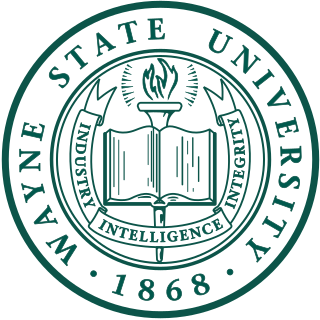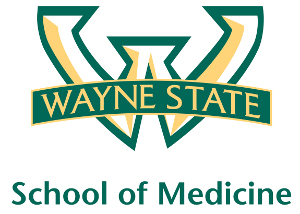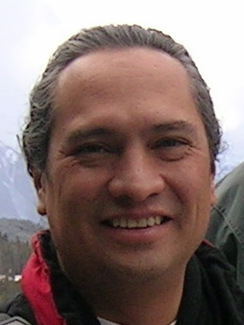Related Research Articles

Biomedical engineering (BME) or medical engineering is the application of engineering principles and design concepts to medicine and biology for healthcare applications. BME is also traditionally logical sciences to advance health care treatment, including diagnosis, monitoring, and therapy. Also included under the scope of a biomedical engineer is the management of current medical equipment in hospitals while adhering to relevant industry standards. This involves procurement, routine testing, preventive maintenance, and making equipment recommendations, a role also known as a Biomedical Equipment Technician (BMET) or as a clinical engineer.

Wayne State University (WSU) is a public research university in Detroit, Michigan, United States. Founded in 1868, Wayne State consists of 13 schools and colleges offering approximately 375 programs. It is Michigan's third-largest university with nearly 24,000 graduate and undergraduate students. Wayne State University, along with the University of Michigan and Michigan State University, compose the University Research Corridor of Michigan. Wayne State is classified among "R1: Doctoral Universities – Very high research activity".
The Keck School of Medicine of the University of Southern California teaches and trains physicians, biomedical scientists and other healthcare professionals, conducts medical research, and treats patients. Founded in 1885, it is the second oldest medical school in California after the UCSF School of Medicine.

The Wayne State University School of Medicine (WSUSOM) is the medical school of Wayne State University, a public research university in Detroit, Michigan. It enrolls more than 1,500 students in undergraduate medical education, master's degree, Ph.D., and M.D.-Ph.D. WSUSOM traces its roots through four predecessor institutions since its founding in 1868.

The President's Council of Advisors on Science and Technology (PCAST) is a council, chartered in each administration with a broad mandate to advise the president of the United States on science and technology. The current PCAST was established by Executive Order 13226 on September 30, 2001, by George W. Bush, was re-chartered by Barack Obama's April 21, 2010, Executive Order 13539, by Donald Trump's October 22, 2019, Executive Order 13895, and by Joe Biden's February 1, 2021, Executive Order 14007.

Scott E. Fraser is an American biophysicist and Provost Professor of Biological Sciences and Biomedical Engineering at the University of Southern California (USC). He is also the Elizabeth Garrett Chair in Convergent Bioscience and Director of Science Initiatives, where he is helping to launch USC’s Initiative in Convergent Bioscience. In addition, he holds joint appointments in the Departments of Physiology and Biophysics, Stem Cell Biology and Regenerative Medicine, Pediatrics, Radiology, and Ophthalmology.

Yannis C. Yortsos is a Greek-American chemical engineer and academic, currently serving as Dean of the Viterbi School of Engineering at the University of Southern California.

Sport Science is an ongoing television series that explores the science and engineering underlying athletic endeavors. Originally filmed as a 12-part series that was broadcast on FSN from September 9, 2007, to April 20, 2008, the second series (2009) also appeared on FSN. Series 3 (2010) was picked up by ESPN. ESPN, who has changed the name of the series to SportScience, has yet to air new episodes. Instead, the network has chosen to air various SportScience vignettes during programs such as SportsCenter. Sport Science is a spinoff of its predecessor Fight Science on National Geographic. Season 1 of Sport Science is currently available for streaming from TVNZ OnDemand.

Gordana Vunjak-NovakovicFRSC is a Serbian American biomedical engineer and university professor. She is a University Professor at Columbia University, as well as the Mikati Foundation Professor of Biomedical Engineering and Medical Sciences. She also heads the laboratory for Stem Cells and Tissue Engineering at Columbia University. She is part of the faculty at the Irving Comprehensive Cancer Center and the Center for Human Development, both found at Columbia University. She is also an honorary professor at the Faculty of Technology and Metallurgy at the University of Belgrade, an honorary professor at the University of Novi Sad, and an adjunct professor at the Department of Biomedical Engineering at Tufts University.
Martin (Maish) L. Yarmush is an academic, American scientist, physician, and engineer known for his work in biotechnology and bioengineering. His faculty career began in 1984 at MIT in the Department of Chemical Engineering as a Principal Research Associate and Lucille P. Markey Scholar in Biomedical Science. In 1988 he joined Rutgers University, as Professor of Chemical and Biochemical Engineering and a member of the Center of Advanced Biotechnology and Medicine. In 1995, he returned to the Boston area to serve as the Helen Andrus Benedict Professor of Surgery and Bioengineering in the Harvard-MIT Division of Health Sciences and Technology, and to establish the Center for Engineering in Medicine at the Harvard Affiliated Teaching Hospitals. In 2007 he returned to Rutgers to hold the Paul and Mary Monroe Endowed Chair in Science and Engineering and serve as Distinguished Professor in the Department of Biomedical Engineering. He also holds a Lecturer in Surgery and Bioengineering position at Harvard Medical School, and is a member of the Senior Scientific Staff at the Shriners children's hospital in Boston.
Tapan K. Datta is a Wayne State University civil engineering professor and researcher who highly specializes in transportation engineering and safety. After receiving his early schooling, undergraduate degrees, and field experience in Calcutta, India, he moved to the United States to complete his master's and doctoral degrees. While in Detroit, MI, he worked for and later owned Goodell Grivas, Inc., a structural engineering consulting firm, and became a full-time faculty member at Wayne State University in 1973. His most notable contributions include work on the roof of Cobo Hall, in Detroit, MI, and the steel structural work done on Jacobs Field in Cleveland, OH. Dr. Datta has also claimed to be the inventor of the double-drive thru at fast food establishments. Dr. Datta also founded the Transportation Research Group at Wayne State University; this group is composed of undergraduate and graduate students that complete transportation-related research grant projects for the State of Michigan.
The Massry Prize was established in 1996, and was administered by the Meira and Shaul G. Massry Foundation until 2019. The Prize, of $40,000 and the Massry Lectureship, is bestowed upon scientists who have made substantial recent contributions in the biomedical sciences. Shaul G. Massry, M.D., who established the Massry Foundation, is Professor Emeritus of Medicine and Physiology and Biophysics at the Keck School of Medicine, University of Southern California. He served as Chief of its Division of Nephrology from 1974 to 2000. In 2009 the KECK School of Medicine was asked to administer the Prize, and has done so since that time. Ten winners of the Massry Prize have gone on to be awarded a Nobel Prize.
Mark S. Humayun is a Pakistani-American ophthalmologist, engineer, scientist, inventor and academic – the only ophthalmologist elected a member of both U.S. National Academies of Medicine and Engineering. He is a university professor with joint appointments at the Keck School of Medicine of USC and the USC Viterbi School of Engineering.

Francisco Javier Valero-Cuevas is an engineer of Mexican origin, and a Professor of Biomedical Engineering, Biokinesiology and Physical Therapy, Aerospace and Mechanical Engineering, Computer Science, and Electrical Engineering at the University of Southern California. He is known for his work on how the human hand works, and its clinical applications. He is notable for several inventions, including devices for measuring hand function and leg function, and the construction of archways in civil engineering. Among his scholarly contributions is a textbook on the mathematical foundations underlying the study of motor control and biomechanics. He is an Elected Fellow of the American Institute for Medical and Biological Engineering (2014), an Elected Senior Member of the Institute of Electrical and Electronics Engineers, and a Thomas J. Watson Fellow.

Habiba Sayeed Alsafar is an Emirati geneticist, biomedical engineer and academic. She is a Professor of Biomedical Engineering & Biotechnology at Khalifa University and is the Dean of College of Medicine and Health Sciences and Director of the Khalifa University Biotechnology Center.
Susmita Bose is an Indian-American scientist and engineer, best known for her research on biomaterials, 3D printing or additive manufacturing of bone implants and natural medicine. She is the Herman and Brita Lindholm Endowed Chair Professor in the School of Mechanical and Materials Engineering at Washington State University.
Ellen Roche is an Irish biomedical engineer and Associate Professor at MIT in the Department of Mechanical Engineering and the Institute of Medical Engineering and Science. She has contributed to heart failure prevention with her inventions, the Harvard Ventricular Assist Device (HarVAD), a soft-robotic sleeve device that goes around the heart, squeezing and twisting it to maintain the heart’s functionality, and Therepi, a reservoir that attaches directly to damaged heart tissue.
Caryn E. Lerman is an American psychologist. She is the director of the USC Norris Comprehensive Cancer Center through the Keck School of Medicine.
Katrina Ann Mealey is an American veterinary pharmacologist. She is a Regents Professor and Richard L. Ott Endowed Chair in Small Animal Medicine and Research at Washington State University.
References
- ↑ Fight Science - Parkour Episode - Ryan Doyle & Daniel Ilabaca, National Geographic, April 5, 2010, retrieved September 26, 2013
- 1 2 3 4 5 How She Does It: Cynthia Bir, Biomedical Engineer, Working Mother, retrieved September 26, 2013
- 1 2 3 Dr. Cynthia Bir (WSU Profile), Wayne State University, retrieved September 26, 2013
- 1 2 3 Cynthia Bir's WSU Homepage, Wayne State University, retrieved September 26, 2013
- ↑ USC in the News 7/11/2013, USC Press Room, July 11, 2013, retrieved September 26, 2013
- 1 2 3 4 Cynthia Bir: One Cool Science Mom, metroparent, February 2011, retrieved September 26, 2013
- 1 2 3 4 5 Participants, World Science Festival Amsterdam, October 2013, retrieved September 26, 2013
- ↑ Wayne State bioengineer Cynthia Bir does 'Sports Science' on 'Dancing with the Stars', mLIVE, April 28, 2010, retrieved September 26, 2013
- 1 2 Wayne State's Cynthia Bir Helps Crash a Plane for Discovery Channel, October 7, 2012, retrieved September 26, 2013
- 1 2 Wayne State Prof Crashes Airplane For Science, CBS Detroit, October 1, 2012, retrieved September 26, 2013
- ↑ Human Factors and Medicine Mission, NATO, retrieved September 26, 2013